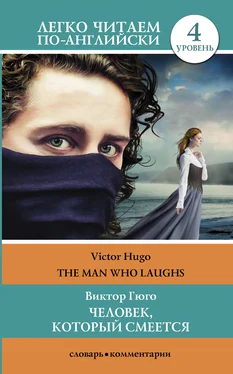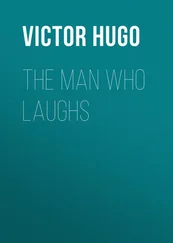The little house on wheels belonged to himself and to the wolf. Besides his house, his retort, and his wolf, he had a flute and a violoncello on which he played prettily. He concocted his own elixirs. In the top of his van was a hole, through which passed the pipe of a stove. The stove had two compartments; in one of them Ursus cooked his chemicals, and in the other his potatoes. At night the wolf slept under the van, amicably secured by a chain. Ursus was fifty, unless, indeed, he was sixty. He accepted his destiny: he ate potatoes, the food of pigs and convicts. He ate them indignant, but resigned. He was not tall – he was long. He was bent and melancholy. Nature had formed him for sadness. He found it difficult to smile, and he had never been able to weep, so that he was deprived of the consolation of tears as well as of the palliative of joy. He had the loquacity of a charlatan, the leanness of a prophet, the irascibility of a charged mine [6] charged mine – заряженная мина
: such was Ursus. In his youth he had been a philosopher in the house of a lord.
This was 180 years ago, when men were more like wolves than they are now.
Homo was no ordinary wolf. From his appetite for medlars and potatoes he might be taken for a prairie wolf; from his dark hair, for a lycaon; and from his bark, for a dog of Chili. He was five feet long, which is a fine length for a wolf; he was very strong. He looked at you askance, which was not his fault. He had a soft tongue, with which he occasionally licked Ursus. Before he knew Ursus and had a carriage to draw, he did his fifty miles a night. Ursus met him in a thicket near a stream. Ursus preferred Homo to a donkey. The ass, a four-legged thinker, has a habit of cocking his ears uneasily when philosophers talk nonsense. As a friend, Ursus preferred Homo to a dog, the love of a wolf is more rare.
Hence it was that Homo sufficed for Ursus. Homo was for Ursus more than a companion, he was an analogue. Ursus used to pat the wolf’s empty ribs, saying:
“I have found the second volume of myself!” Again he said, “When I am dead, I shall leave a true copy behind me.”
Ursus had communicated to Homo a portion of his talents: such as to stand upright, to restrain his rage into sulkiness, to growl instead of howling, etc. On his part, the wolf had taught the man what he knew – to live without a roof, without bread and fire, to prefer hunger in the woods to slavery in a palace.
The van traversed many different roads, without, however, leaving Great Britain. The van was strong, although it was built of light boards like a dove-cot. In front there was a glass door with a little balcony used for orations. At the back there was a door with a panel. It had been painted, but of what colour it was difficult to say.
Ursus admired Homo. To be always raging inwardly and grumbling outwardly was the normal condition of Ursus. He was the malcontent of creation. He gave his satisfaction to no one and to nothing. It is probable that in secret Ursus criticized Providence.
He approved of none but princes. He travelled freely from one end of Great Britain to the other, selling his philtres and phials. He passed with ease through the nets which the police at that period had spread all over England in order to sift wandering gangs [7] wandering gangs – бродячие шайки
, and especially to stop the progress of the Comprachicos [8] Comprachicos – компрачикосы, скупщики детей, преступное сообщество торговцев детьми
.
Ursus belonged to no gang. Ursus lived with Ursus, a tête-à-tête [9] tête-à-tête – наедине (фр.)
, into which the wolf gently thrust his nose. The solitary man is a modified savage, accepted by civilization. The sight of towns increased his taste for brambles, thickets, thorns, and holes in the rock. His home was the forest. What he disliked in his van was its having a door and windows, and thus resembling a house.
He did not smile, but he used to laugh; sometimes, indeed frequently, a bitter laugh. There is consent in a smile, while a laugh is often a refusal.
His great business was to hate the human race. He was implacable in that hate. It was clear for him that human life was a dreadful thing. He observed the superposition of evils, kings on the people, war on kings, the plague on war, famine on the plague, folly on everything. He recognized that death was a deliverance – but when they brought him a sick man he cured him. He put lame cripples on their legs again, and hurled this sarcasm at them,
“There, you are on your paws once more; may you walk long in this valley of tears!”
When he saw a poor man dying of hunger, he gave him all him money, growling out,
“Live on, you wretch! eat! I won’t shorten your penal servitude.”
After that, he would rub his hands and say,
“I do men all the harm I can.”
Through the little window at the back, passers-by could read on the ceiling of the van these words, written within, but visible from without, inscribed with charcoal, in big letters, -
Ursus, Philosopher.
Who now knows the word Comprachicos, and who knows its meaning? The Comprachicos, or Comprapequeños, were a hideous and nondescript association of wanderers, famous in the 17th century, forgotten in the 18th, unheard of in the 19th. The Comprachicos are part of old human ugliness. They belong to the colossal fact of slavery. Joseph sold by his brethren is a chapter in their story. The Comprachicos have left their traces in the penal laws [10] penal laws – уголовные кодексы
of Spain and England. You find here and there in the dark confusion of English laws the impress of this horrible truth, like the foot-print of a savage in a forest.
Comprachicos, the same as Comprapequeños, is a compound Spanish word signifying Child-buyers. The Comprachicos traded in children. They bought and sold them. They did not steal them. The kidnapping of children is another branch of industry. And what did they make of these children? Monsters. Why monsters? To laugh at.
The populace must laugh, and kings too. The mountebank is wanted in the streets, the jester at the Louvre. The one is called a Clown, the other a Fool. The efforts of man to procure himself pleasure are at times worthy of the attention of the philosopher.
A child destined to be a plaything for men – such a thing has existed; such a thing exists even now. In order that a human toy succeeds, he must be taken early. The dwarf must be fashioned when young. We play with childhood. But a well-formed child is not very amusing; a hunchback is better fun.
Hence grew an art. There were trainers who took a man and made him a misshapen creature [11] misshapen creature – уродец
. They took a face and made a muzzle; they stunted growth; they kneaded the features. Where God had made harmony, they made discord; where God had made the perfect picture, they re-established the sketch; and, in the eyes of connoisseurs, it was the sketch which was perfect. They debased animals as well; they invented piebald horses. Nature is our canvas. Man has always wished to add something to God’s work. Man retouches creation, sometimes for better, sometimes for worse.
To degrade man tends to deform him. The suppression of his state was completed by disfigurement. Certain vivisectors of that period succeeded marvellously well in effacing from the human face the divine effigy. The inventor of this branch of surgery was a monk named Avonmore – an Irish word signifying Great River.
Читать дальше












